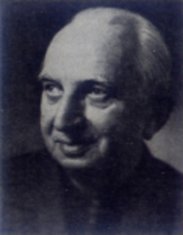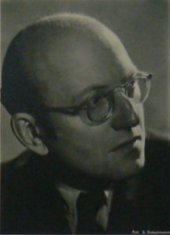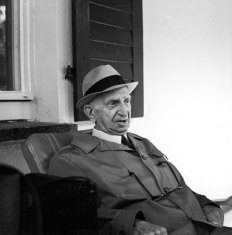|
|
Max Butting (Composer) |
|
Born: October 6, 1888 - Berlin, German Empire
Died: July 13, 1976 - Berlin, East Germany |
|
Life |
|
The German composer, Max Butting, was the son of an ironmonger and of a piano teacher. He received his first musical instruction from his mother and later from the organist Arnold Dreyer. After attending secondary school (Realgymnasium), he studied at the Akademie der Tonkunst (Academy of Composition) in Munich from 1908 to 1914. There, he received instruction in composition from Friedrich Klose, conducting from Felix Mottl and Paul Prill, as well as singing from Karl Erler. He also attended lectures in psychology, philosophy and musicology at the Munich University. Butting learned composition by private instruction from Walter Courvoisier, for the most part, whom Klose had recommended to him after a disagreement.
Max Butting was not called for military service in World War I due to bad health. On the urging of his father, he worked as an assistant in his father's business when he returned to Berlin in 1919, where he remained until 1923. However, he was allowed sufficient free time for composing. He quickly got in contact with other young artists and became friendly with Walter Ruttmann and Philipp Jarnach, among others. In 1921, Butting was admitted into the left-wing Novembergruppe and he led their musical events until 1927. In 1925, he was also a musical journalist for the Sozialistischen Monatsheften (Socialist Monthly Magazine). His works became better known through performances at the music festivals of the Gesellschaft für Neue Musik (Society for New Music), where Butting worked as a member of the board in the German section between 1925 and 1933, and at the Donaueschinger Musiktage. In 1929, Hermann Scherchen conducted Butting's Third Symphony in Geneva, which also brought him recognition at the international level. In the same year, the composer became the vice-chairman of the Genossenschaft deutscher Tonkünstler (Co-operative of German Composers).
Max Butting was one of the first composers to confront his art with the medium of radio. He was thus a member of the cultural advisors of the Funkstunde (Radio Hour) from 1926 until 1933 and the leader of a studio for radio interpretation at the Klindworth-Scharwenka Conservatory from 1928 until 1933. Aside from that, he held master courses in radio composition at the Rundfunkversuchsstelle (Radio Experimental Office) of the Berliner Hochschule für Musik (Berlin College of Music), where Ernst Hermann Meyer was one of his students.
In January 1933, Max Butting was even named a member of the Prussian Academy of Arts, however it became clear soon after Adolf Hitler took power that he was not wanted by the National Socialists. Until 1938, Butting was still able to work in the copyright company, STAGMA. After that, he again had to exist from his father's ironmonger business, partial ownership of which he had inherited after his father's death in 1932, and which he took over on his own at the beginning of 1939. To ensure the survival of the business and thus be able to support himself, the composer finally found himself obliged to join the NSDAP in 1940.
After World War II, Max Butting gave up his business activities and lived as a freelance composer in East Berlin. In 1948, he became a member of the Kulturbund der DDR (Cultural Association of the DDR) and chief editor in the state radio committee of the GDR. In 1950, he was a founding member of the Deutsche Akademie der Künste (German Academy of the Arts), of which he was vice-president from 1956 until 1959, and a board member of the Verband Deutscher Komponisten und Tonsetzer (Association of German Composers, the VdK of the GDR) as of 1951, as well as the leader of the advisory council of the Anstalt zur Wahrung der Aufführungsrechte (AWA, Institute for the Protection of Performance Rights). In the GDR, Butting received numerous honours: he received the silver Vaterländischer Verdienstorden (Fatherland Order of Merit) in 1961 and later in gold, an honorary doctorate from the Humboldt University of Berlin in 1968, and the National Prize of East Germany in 1973. |
|
Tone Language |
|
Max Butting's music at first took up the style of Anton Bruckner and Max Reger and moved closer to more modern trends in the 1920s. He gradually managed to develop a distinctive personal style, which is pre-eminently characterized by counter-point and is equally close to both musical neoclassicism and expressionism. The meter/rhythm is complex for the most part and commonly contains changes in time. The harmony varies within an often dissonant, sharpened tonality. From time to time, there are twelve-tone themes, for example in Sinfonie Nr. 9, however Butting never develops a true dodecaphony, in the sense of Arnold Schoenberg, whom he critically admired. The composer also formally oriented himself on traditional models, such as the sonata form, however he commonly varied it or gave it up entirely in more than a few works in favor of a development form which has no breaks. He always tried to find an individual form for each work, as his symphonic works show in an exemplary manner, in which all cyclic formations are represented, from single-movement to five-movement works.
A rather moderately productive composer before 1945 and almost completely silenced during the Nazi regime, Butting experienced a new creative impetus after the end of World War II. The fact that the largest number of his works by far were created in the GDR is explainable above all in that he now made it one of his responsibilities to also write "everyday music", which was supposed to fulfill the state demand for a popular, easy-to-understand art. He started from some works he had already written especially for the radio at the end of the 1920ís, which are stylistically close to sophisticated light music.
In the center of Max Butting's works are the ten symphonies, which identify him as one of the most important German symphonists of his generation. In addition to these, he wrote a chamber symphony for thirteen solo instruments, two symphoniettas ("little symphonies") and a triptychon for large orchestra. Aside from that, he wrote chamber music above all, among which ten string quartets stand out. Others of his remaining works include a piano concerto and a flute concerto, numerous shorter orchestral pieces, predominantly small piano works, as well as the oratorio Das Memorandum, the opera Plautus im Nonnenkloster after Conrad Ferdinand Meyer and several cantatas.
His music is animated by polyphonic purposefulness and is marked by rhythmic vitality and lyric meditation. Since many of his works were destined for amateur performances, Butting shunned modernistic involvements; however, in his 9th and 10th symphonies he applied dodecaphonic structures. |
|
Selected Works |
|
Orchestral:
Trauermusik, Op. 12 (1916)
Symphony No. 1, Op. 21 for 16 Instruments (1922)
Chamber Symphony for 13 Instruments, Op. 25 (1923)
Symphony No. 2, Op. 29 (1926)
Symphony No. 3, Op. 34 (1928)
Sinfonietta with Banjo, Op. 37 (1929)
Serene Music, Op. 38 (1929)
Symphony No. 4, Op. 42 (1942)
Symphony No. 5, Op. 43 (1943)
Symphony No. 6, Op. 44 (1953, first version 1945)
Totentanzpassacaglia, Op. 51 (1947)
Symphony No. 7, Op. 67 (1949)
Sonatina for String Orchestra, Op. 68 (1949)
Concerto for Flute and Orchestra, Op. 72 (1950)
Symphony No. 8 "Die Urlaubsreise", Op. 84 (1952)
Symphonic Variations, Op. 89 (1953)
Five Serious Pieces after Dürer, Op. 92 (1955)
Symphony No. 9, Op. 94 (1956)
Sinfonietta, Op. 100 (1960)
Symphony No. 10, Op. 108 (1963)
Concerto for Piano and Orchestra, Op. 110 (1964)
Legende (1966)
Triptychon, Op. 112 (1967)
Stationen,, Op. 117 (1970)
Gespenster besuchten mich,, Op. 120 (1972)
Concert Overture (1973).
Chamber:
String Quartet No. 1 in A major, Op. 8 (1914)
Quintet in C minor, Op. 10 (1915)
String Quartet No. 2 in A minor, Op. 16 (1917)
String Quartet No. 3 in F minor, Op. 18 (1918)
String Quartet No. 4 in C sharp minor, Op. 20 (1919)
Quintet for Violin, Viola, Cello, Oboe & Clarinet, Op. 22 (1922)
Miniatures for String Quartet, Op. 26 (1923)
Wind Quintet (1925)
String Quartet No. 5, Op. 53 (1947)
Piano Trio, Op. 54 (1947)
String Trio (1952)
String Quartet No. 6, Op. 90 (1953)
String Quartet No. 7, Op. 95 (1956)
String Quartet No. 8 "Die Nachgeburt", Op. 96 (1957)
String Quartet No. 9, Op. 97 (1957)
String Quartet No. 10, Op. 118 (1971)
Piano:
Sonata, Op. 82 (1951)
Sonatina for Gretl, Op. 87 (1852)
Two Toccatas, Op. 88 (1953)
Many other piano pieces
Vocal:
Das Memorandum, Op. 52, Oratorium (1949; libretto: Max Butting)
An den Frühling, Op. 59, Kantate (1948; libretto: Max Butting)
Der Sommer, Op. 61, Kantate (1948; libretto: Max Butting)
Der Herbst, Op. 62, Kantate (1948; libretto: Max Butting)
Der Winter, Op. 63, Kantate (1948; libretto: Max Butting)
Die Lügengeschichte vom schwarzen Pferd, Op. 71, Kantate (1949; libretto: A. Eckener)
Plautus im Nonnenkloster, Op. 98, opera (1958; libretto: Hedda Zinner; premiere: Leipzig, October 3, 1959)
Choruses; Songs |


 |
|
Source: Wikipedia Website (July 2011); SLUB Deutsche Fotothek (Photos); Bakerís Biographical Dictionary of 20th Century Classical Musicians (1997)
Contributed by Aryeh Oron (July 2011) |
|
Max Butting : Short Biography | Bach-inspired Piano Works: Works | Recordings | Other Arrangements/Transcriptions: Works | Recordings |
|
Links to other Sites |
|
Max Butting (Wikipedia) [English]
Max Butting (Wikipedia) [German] |
|
|
Bibliography |
|
Max Butting : Musikgeschichte, die ich miterlebte (Henschel, Berlin 1955)
Dietrich Brennecke: Das Lebenswerk Max Buttings (Deutscher Verlag für Musik (DVfM), Leipzig 1973) |
|
|